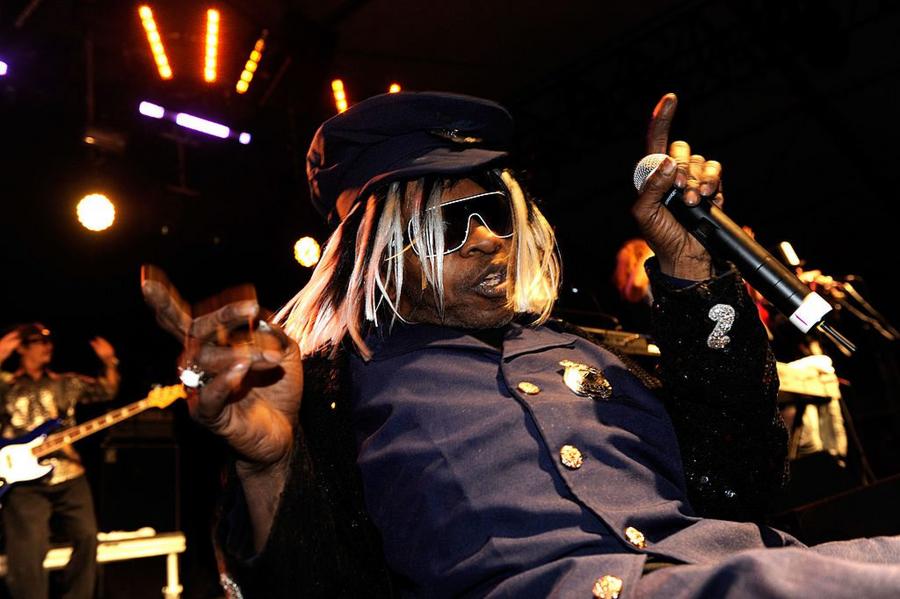What Is Sly Stone's Net Worth?
Sly Stone is an American singer, songwriter, musician, and producer who has a net worth of $500 thousand. Sly Stone, born Sylvester Stewart, is a pioneering musician, songwriter, and producer best known as the frontman of Sly and the Family Stone. His innovative fusion of funk, rock, soul, and psychedelia helped shape the sound of popular music in the late 1960s and 1970s. As one of the first racially integrated bands with both male and female members, Sly and the Family Stone broke barriers in the music industry while producing anthems like "Dance to the Music," "Everyday People," and "Thank You (Falettinme Be Mice Elf Agin)." Their performance at Woodstock in 1969 cemented them as one of the defining acts of their era.
Sly's production techniques and socially conscious lyrics made him a visionary but by the mid-1970s, drug addiction and erratic behavior led to the band's decline. After years of legal and financial troubles, he largely disappeared from the public eye. Despite his struggles, his influence remains profound, inspiring artists from Prince to Dr. Dre. In 1993, Sly and the Family Stone were inducted into the Rock and Roll Hall of Fame, and Sly received a Grammy Lifetime Achievement Award in 2006, solidifying his place as a true musical icon.
His 2023 memoir, Thank You (Falettinme Be Mice Elf Agin), shed light on his struggles, and in 2025, a Questlove-directed documentary brought renewed recognition to his legacy. While his story remains a cautionary tale of industry exploitation, Sly Stone's influence on music remains immeasurable.
Financial Problems and Royalty Lawsuit
Sly made what turned out to be a major financial blunder in 1984 when he sold his music publishing rights to Michael Jackson for $1 million. Though $1 million in 1984 was a decent sum of money, it was a fraction of what his rights would have been worth over the next 30 years. Tragically, in 2011, it was revealed that Stone was broke and living out of a van that he parked in various sections of South Central Los Angeles. Sly befriended a local family that was letting him use their house to take showers and eat meals.
Sly's serious financial problems date back to 1989, when he suddenly stopped receiving royalty checks from his business manager Gerald Goldstein. He launched a lawsuit that dragged on for more than three years. In January 2015, a Los Angeles jury awarded Sly $5 million in his breach-of-contract lawsuit. Half of the judgment was levied against a company called Even St. Productions, which filed for bankruptcy protection in 2013. The other half was levied against his former managers who have vowed to appeal the decision.
In December 2015, Sly's legal victory was abruptly reversed when a judge ruled that he had legally signed away his royalty rights in a 1989 contract, effectively nullifying his ability to collect the $5 million judgment. Despite evidence suggesting the deal was exploitative, the court determined that Sly had willingly transferred his royalties in exchange for an ownership stake in his former manager's company. Left without recourse, Sly remained in financial hardship for years. However, in 2016, a settlement allowed him to regain control of some of his intellectual property, including the name Sly & The Family Stone. Though he never recovered the fortune he lost, Sly's financial situation stabilized somewhat in his later years.

Kevin Winter/Getty Images
Early Life
Sly Stone was born Sylvester Stewart on March 15, 1943, in Denton, Texas. The family then moved to the North Bay area of San Francisco. Stone was the second of the family's five children. He was raised in a deeply religious home by his parents, K.C. and Alpha Stewart, who were both members of the Church of God in Christ. His parents encouraged musical expression in their household and so Stone and three of his siblings formed The Stewart Four. The group performed gospel music at the local church and even recorded a single local release called "On the Battlefield."
Stone was identified as a musical prodigy. At the age of seven, he was already proficient on the keyboard and then mastered the guitar, bass, and drums in the next few years. While in high school, he joined a number of high school bands, including the Viscaynes, a doo-wop group of which Stone and his friend, Frank Arellano, were the only non-white members. The experience would later inspire Stone to create the multicultural Family Stone group. After finishing high school, Stone studied music at the Vallejo campus of Solano Community College.

Sly Stone / Charley Gallay/Getty Images
Career
Stone began working as a disc jockey for the soul radio station KSOL in the mid-1960s. He became instrumental in guiding KSOL to play more soul music. He, at the same time, was a staff record producer for Autumn Records, which produced predominantly white San Francisco bands like The Mojo Men, Bobby Freeman, and The Great Society, among others. He also at the time was playing keyboard for performers like Dionne Warwick, Freddy Cannon, Marvin Gaye, Gene Chandler, and Dick & Dee Dee, among others. Sly also had his own band, Sly and The Stoners, while one of his brothers, Freddie, had a band called Freddie and the Stone Souls. The two decided to fuse the bands together and performed around the Bay Area in the late 1960s. They called the band Sly and the Family Stone.
The group released their debut album, "A Whole New Thing," in 1967, which received modest reviews. However, they soon after had their first hit with "Dance to the Music" in 1968, which was included on an album of the same name. While their third album, "Life," did not perform well, the group had a hit with their fourth album, "Stand!" in 1969. It became a runaway success and sold three million copies and featured a number one hit, "Everyday People." By the summer of 1969, the group was one of the biggest names in music. They released two more top-five singles, "Hot Fun in the Summertime" and "Thank You/Everybody Is a Star." They also appeared at Woodstock and the Summer of Soul concerts in Harlem.
The group then began touring around the country and drew widespread praise for their explosive live shows, which attracted a very diverse audience of both white and black fans. Notably, when Bob Marley first played in the United States in 1973, he opened on tour for Sly and the Family Stone. However, the success did not last forever, as the band experienced a number of personal problems, many of which were related to interpersonal drama and too much drug use. Stone went on to record four albums as a solo artist in the mid to late-1970s. He also collaborated with Funkadelic on "The Electric Spanking of War Babies" in 1981, though he was ultimately unable to reinvigorate his career.
Over the following decades, Stone continued to work in music before taking an extended hiatus. His last public appearance was in 1993 when he appeared onstage with Sly and the Family Stone to be inducted into the Rock and Roll Hall of Fame. He was invited by the other six members of the original Family Stone to record a new album in 2003, but he declined. He did not make another public appearance until 2006, when he gave his first live musical performance at the 2006 Grammy Awards, during which there was a tribute to Sly and the Family Stone.
Over the next years, Stone made more frequent performances at places like the Montreux Jazz Festival, the North Sea Jazz Festival, and others. During this time, he developed a reputation for leaving his sets abruptly and not returning.
Personal Life
Stone married model and actress Kathy Silva in June of 1974 during a sold-out performance at Madison Square Garden. The couple already had a son together born in late 1973. The couple separated in 1976 after their son was mauled by Stone's dog. Sly had a daughter in 1976 by Cynthia Robinson. In 1982, he had another daughter named Novena.
During his rise to fame with Sly and the Family Stone in the 1970s, Sly developed a drug problem, as did other members of the band. His behavior became increasingly erratic and contributed to the decline of the Family Stone's popularity. He was arrested and charged with cocaine possession in Florida in 1983.
/2015/02/GettyImages-98537698.jpg)
/2014/04/GettyImages-544503306.jpg)
/2010/11/George-Clinton-e1739657171540.jpg)
/2010/05/dc.jpg)
/2021/05/bb.jpg)
/2013/09/GettyImages-490894070-1.jpg)
/2020/07/mlp.jpg)
/2010/01/Deryck-Whibley.jpg)
/2020/07/jl.jpg)
/2010/01/GettyImages-183679600.jpg)
/2022/10/Anne-Murray.jpg)
/2014/09/Kim-Delaney.jpg)
/2009/11/Tim-Duncan.jpg)
/2023/01/lance-armstrong.jpg)
/2021/04/Sara-Gilbert.jpg)
/2025/03/Kelli-Ferrell.jpg)
/2010/05/Jaleel-White.jpg)
/2015/02/GettyImages-98537698.jpg)
/2010/11/George-Clinton-e1739657171540.jpg)
/2025/02/Sly-Stone.jpg)
/2014/04/GettyImages-544503306.jpg)
/2010/05/dc.jpg)
/2015/06/otis2.jpg)
/2020/06/johnny-cash.jpg)